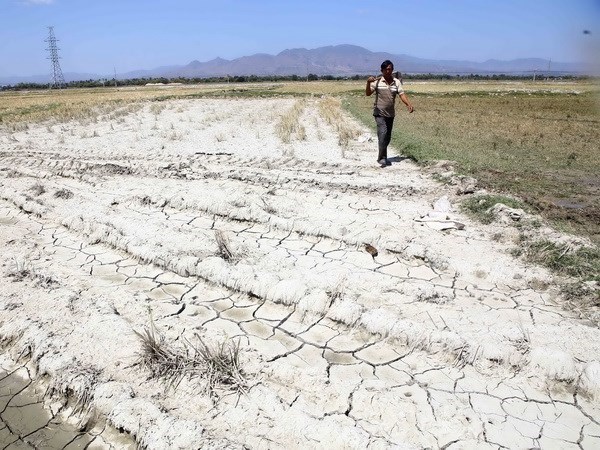Seminar seeks solutions to climate change in Mekong Delta
A seminar on building plans in response to drought, saline intrusion and flooding which are consequences of climate change in the Mekong Delta region was held in Can Tho city on July 21.
 Drought in Mekong Delta region (Source: VNA)
Drought in Mekong Delta region (Source: VNA)Director of the Department of Crops Production Nguyen Hong Son said the agency aims to build a crop structure map for the whole region. However, it cannot cover small areas in the region but only large sub-regions such Dong Thap Muoi and Long Xuyen quadrilateral, Ca Mau Peninsula and coastal areas, and alluvium areas.
According to Dr. Bui Tan Yen from the Research Programme on Climate Change, Agriculture and Food Security in Southeast Asia, the Mekong Delta region is negatively impacted by climate change, especially drought, saline intrusion and flooding.
He said it is necessary to apply different adaptive solutions to each locality in the region.
He also noted the lack of coordination among regional localities in responding to climate change as well as in building long-term response plans, stressing the need to build disaster risk maps and enhance links among relevant sectors.
Luong Quang Xo, Vice Director of the Southern Irrigation Science Research Institute, said the agency is working with the Department of Crops Production to build disaster risk maps, laying a foundation for localities to reschedule crops, thus reducing production costs and avoiding risks.
Participants recommended solutions to the issue, including storing water for the dry season and growing crops that require less water among others.
According to Dr. Le Quang Tri, Director of the Climate Change Research Institute of the Can Tho University, the Mekong Delta is facing six risks including climate change and rising sea level; hydroelectricity development in Mekong River; increasing population and migration; over-exploitation of natural resources; change of land use; and land, water and air pollution.
Regional farmers concurrently meet many difficulties, and they need solutions that help them effectively adapt to climate change and improve livelihoods, he stressed.-VNA













